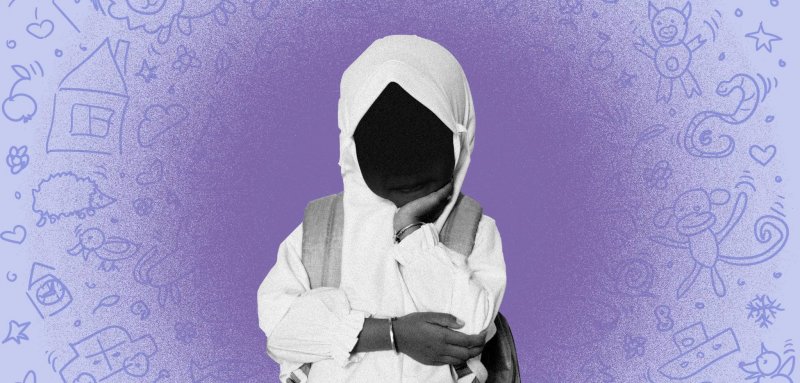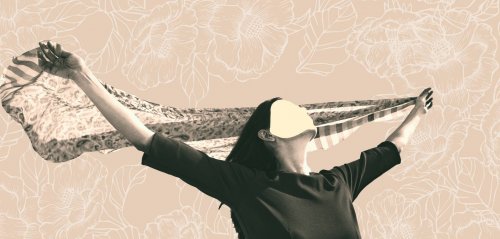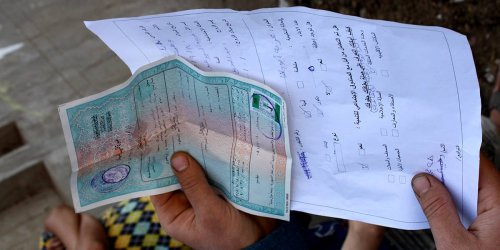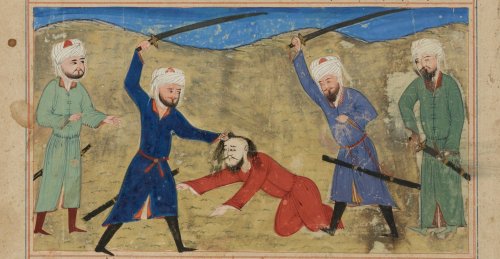We hear many stories in Egypt about forcing women to make certain choices. Rather, forcing or making decisions on their behalf is the rule and the exception is women who can speak for themselves.
There are those who are forced to study a specific subject, marry a certain person or give up their dreams of traveling, working or completing their education, in the end, there are multiple forms of compulsion and subjugation, and it can be said that the most obvious form of compulsion is to compel a woman to wear the veil, and threaten if she takes it off.
Until recently, the veil was imposed by most families in the middle classes on girls after puberty, but it has become more commonplace of late to see a girl no more than 10 years old wearing a headscarf on her head, whether in school or on the streets, and news about schools that force girls to wear the hijab has become commonplace.
There are many different motivations that make some fathers or mothers force a young girl to cover her hair beyond the religious or moral statements that are presented about the veiling of children, such as getting them used to "chastity" and "modesty" from childhood.
I Have Issues
Hagar. A, a young woman in her twenties from Menoufia Governorate tells her story: “I was a freshman in high school, I was forced to wear the Hijab in stages, In school being subjected to corporal punishment because I don’t wear the veil, so I started wearing it inside the school and taking it off outside until my mom decided to circumcise me or, as she described it put me through “purification”. The day I was circumcised was the day I began wearing the Hijab. In a scene to rival the bleakest, most brutal film scenes, I was a child sitting in my Hijab receiving congratulations for having undergone circumcision.
Hajar tried to rebel against the hijab but was surprised by her mother's reaction, who screamed hysterically, and disowned her which is a method often used by mothers angered by the behavior of her daughters, Hajar says: "I had no solutions but to go back to wearing it but the memory of the half-day when I took off the veil is the first and the last time I felt free, inside me I hate the veil so much, and my desire to take it off still overwhelms me, I know this can’t be Allah’s wish for us, for the veil is an ugly thing."
The young woman in her 20’s adds to Raseef 22: "The hijab hasn’t only affected my appearance. Even now, I don’t feel like a 22-year-old girl, I feel like years of my life were stolen from me, I can’t recall if my hair was ever free or put down because it was denied to me as it was “wrong” and it was always tied back in a braid.
Hajar continues: "I confess that I have complexes and the main reason for this are experiences of circumcision and forced hijab. I did find a member of my family who stood beside me, on the contrary, they do not see me as enough of a believer and even sometimes think that I am a non-believer, although I persevere in prayer and reading the Qur’an, but. none of them care about this. So that when I discussed taking off the hijab again with my mother she said to me: “Wear the hijab and may God guide you to the rest of the religious duties.”
Hajar concluded saying: "I vowed to myself that I will not have children until I feel freedom, so how can I raise my children to be free when I am throttled by the hijab.”
In a scene that rivals the bleakest, most brutal film scenes, Hagar, a preteen who just had her genitals chopped and mutilated, and forced to cover her head was expected to sit and smile at the centre of celebrations for her purification. #Egypt #FGM
"I confess that I have complexes and the main reason for this are my violent circumcision and the forced hijab. Any resistance is termed heresy." On #FGM and the spreading #Hijab in #Egypt.
The Revolution and the Hijab
Hajar very much resembles 23 year old Fairuz Imad, (a pseudonym), a student at the Faculty of Engineering and a researcher in a civil society organization, living in Alexandria, who tells us her story of being forced to wear hijab: “The story started at about the age of ten when my father started imposing restrictions on my clothes Then when I was in my second preparatory stage, there was a phase of being beguiled to wear the hijab for example with promises of a new phone, more expensive clothes, and so on, then the intimidation stage began, and that the hijab must be worn because my parents will be held accountable by God for things I do and all of these methods proved successful.”
Fairuz continues: "In the summer that preceded my third preparatory year I decided to wear the hijab and at that time I did not like to admit that I was forced in any way, so I had a defensive technique, to announce my decisions to appear as if I had taken them completely freely even when my friends were surprised by it, I kept saying that this was my decision and my choice. "
But with the passage of time, the hijab negatively affected Fairuz's relationship with herself she said: “All through the months of the holidays before going to school I would refuse to leave the house altogether, and whenever I tried to get out of the house, as soon as I see myself wearing the hijab in the mirror, I would hate myself and hate appearing publicly with it."
The young NGO researcher continued, "Then I started trying to adapt to reality, for example, I tried to buy more elegant clothes, I started to learn to how to put on make-up, and I was then trying to compensate for the feeling of deprivation inside me by applying exaggerated makeup and using bright colors, On the other hand, I was dealing in a strange way with my hair, and I felt that it was no longer mine, so I stopped caring about it, I would just wash it and then put it up and that was that so it became damaged, of course, it was as if I was taking revenge on it and myself, even when I gained weight and my face broke out in pimples I didn’t bother to deal with any of these problems."
Fayrouz adds: " This was until I turned 18 it was 4 years after the outbreak of the January 25 revolution, I began to meet and get to know other people like me, and I started to get involved in the public and for the first time in my life I saw a post on Facebook of a girl who took off the hijab, at that moment that the myth on which my parents raised me is that, if we put on the hijab we cannot take it off again, it is not a fact, and through research, I learned that there were hundreds of other girls who had taken off the hijab she continues “At this time I became more aware of the reality experienced by women, I saw girls talk boldly about harassment, violence, coercion, and guardianship, and I learned about the feminist movement and that we must understand first that there is discrimination against us as women, and not deny it in order to protect ourselves psychologically.
The young woman in her 20’s goes on: "At that point, I started taking off the hijab without my family knowing as affected by these movements and ideas, but when my mother found at first she completely rejected what I was doing but with time when she observed how the Hijab impacted my psyche negatively and my nerves she began to empathize with and came to understand that I couldn’t accept it in any way.”
Fayrouz’s mother’s relationship with her changed as soon as she discovered she had taken off the hijab, assaulting physically, and threatening to kill her. Fairuz says “I was surprised by my Dad choking me and screaming “I’ll kill you before you disobey me” it was a big shock because my father was never the violent time, violence was never part of mine and my brothers’ upbringing and it was then I realized he had never resorted to violence because he was an angel but because I was obedient to him.”
Mother Says I Am Ugly
Sarah Al-Muhandis, 24, is a teacher in a nursery school in Giza. Her mother forced her to wear hijab for other reasons, far from the usual religious reasons. She recounts what her childhood was like “She forced me to wear the Hijab because I had frizzy hair as my mother described it and because there are beauty standards and stereotypes, she used to see me as ugly, and that my hair should be covered all the time since I was only 7 years old, I never forgave her, parents are supposed to give their children security and self-confidence at that early age, but what happened to me was the exact opposite, my mother constantly used to say to me within earshot that my hair looked like dishwashing wire and that I wasn’t as beautiful as her niece with the fine straight hair.”
Al Muhandis continued: "She did not try to understand that every person is different whether their personality or their physical features. The is that my mother was the first bully I ever met in my life, and if the matter stopped at verbal abuse I could have gotten over it but she forced me to cover my hair for no reason, so the air never caressed my hair and I have never experienced the freedom of choosing my appearance ever and all this destroyed my relationship with my hair and body until I turned twenty while hating my appearance and my hair of course and then I discovered hair product lines for curly hair and then I began to care for my hair and learned about its type, I reconciled with it, and then I quietly took off the veil, after two years, my hair has improved a lot, and I became stronger in defending myself against any bullying and indeed now I am content with my appearance.”
The psychiatrist, Dr Ahmed Abdullah, a professor of psychiatry at Zagazig University, commented: "Forcing young girls to wear the Hijab is a practice that sends messages that reveal much about society, but first it must be noted that any religious duty or action people should only be held accountable for them after puberty, and this is what it says in the Qur’an, as for what some families do, it is an attempt to outdo God which is very strange, and we come here to the first message, which is being afraid and intimidated by society. I as a parent cannot control peoples’ behaviour and especially that of men and it’s not plausible that society would change, I despair of that and even sometimes reject it so for that reason I tyrannize the weakest link in society or that I imagine to be so and that’s women so for that reason I force women to cover up or disappear and that all begins from early on, a child at the end is a small woman that must be programmed with the rules of this society.”
Monitoring Relations With Allah
The second message, which we can understand from imposing the hijab on young girls, Abdullah says to Raseef22: "It is sectarian, so we start to plant an idea, (us and them), and if you observe closely at the promotions for the veil and the messaging broadcast by teachers in schools that hair must be covered to distinguish between Muslim and Christian, and the result of which is that we live in a society that does not understand or recognize differences."
Abdullah adds: "As for the third message, and it also has to do with the difference, but the difference in shape, the Egyptian society does not have enough awareness to resist the stereotypical standards of beauty. Every woman who does not have the ideal weight or her hair is not smooth and straight, she is deficient in beauty or ugly, and the ugly thing what do we do in it? Of course, we cover it, and this is how society deals with women, which results in a great distortion in the relationship of women to their bodies.
The professor of psychiatry ends with: "As for the last message, it is somewhat social, according to which society has the authority to monitor the relationship of a woman to her God, of course, there is disagreement over whether the Hijab is religious obligation or not, but we’ve gone beyond that point, As a society, we plant in girl’s brains that we are their watchdogs and guardians of how religions they are and it is my right to intervene and appraise this relationship.”
*The views and opinions expressed in this article are those of the author and do not necessarily reflect Raseef22
Raseef22 is a not for profit entity. Our focus is on quality journalism. Every contribution to the NasRaseef membership goes directly towards journalism production. We stand independent, not accepting corporate sponsorships, sponsored content or political funding.
Support our mission to keep Raseef22 available to all readers by clicking here!
Interested in writing with us? Check our pitch process here!





